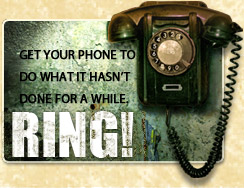Yours is a small or medium-sized business and you’re finding things tough. The first thing you need to know is that you’re not alone. The world’s been in recession for a number of years now and as much as we’d like it to be, South Africa is not immune and no island. Unfortunately what transpires in Washington and London has a large impact on what happens here, and the present climate is not exactly kind for businesses.
So what to do? Well, here’s what not to do: stop advertising. Reduce your advertising spend by all means, but don’t put a halt to it. Whilst marketing expenditure is the easiest thing to chop or trim to help the bottom line, care must be taken in terms of what to cut and where to cut.
Whilst it has almost become standard practice to reduce advertising budgets when times get tough, it could be argued that marketers should instead increase their marketing budgets in a recession and adopt a more aggressive positioning in the marketplace. For the purposes of this article, however, let’s assume that the decision has been made to reduce advertising expenditure.
One way of doing so is to move from your existing large ad agency (if you have one) to a smaller ad agency, where costs are sure to be lower. What you save on agency fees you can add to your advertising budget. (Talking of ad agencies: unless you’re a big advertiser requiring multiple teams to manage your advertising account, go the small agency route. Small ad agencies often work from home or share business premises to keep their overheads down, and you’ll likely benefit from their lower costs and more personalised service. The tougher the economic climate, the more they’ll do to hold onto your advertising account and keep you happy. Large agencies will likely not have the same flexibility to accommodate you).
Assuming you have an advertising agency or marketing consultancy: a meeting should be called to look at what within your marketing mix is working – and not working. Once this has been established, you’ll have an idea as to what to cut from your media schedule. Why a meeting to discuss what might seem so obvious? For one thing, your ad agency may take a different view on things and be able to provide reasons for dropping (or reducing) one advertising medium over another.
Several practical solutions may emerge from a meeting. Consideration may, for instance, be given to reduce your current thirty second TV spot to a fifteen or twenty second TV commercial rather than cancel your television advertising in total. It might make sense to move your expensive radio drivetime advertising slots to less expensive morning or afternoon radio time slots. Rather than running full page advertisements in magazines, it may make sense to flight half page ads instead, and change them from full colour to black and white.
There are a million ways to reduce your advertising costs, and your advertising agency or marketing consultancy would be positioned to advise you in this regard. Typically in a recession, certain media types fall out the window. Promotional gifts may be nice-to-haves but are they essential? Fridge magnets, magnetised licence disc holders, golf shirts, coffee mugs…all these things are cool but when times are tough, marketers need to focus on those advertising media that will get the phones to ring. Depending on your business, street pole posters and billboards may work better than radio advertising: TV advertising may work better than newspaper advertising: magazine advertising may work better than cinema advertising.
One thing is a non-negotiable, however: a well-written, content-rich and easily navigable website, marketed correctly online. With most people out there searching for products or services on the web, it is critical that you have a a good website. If you’re not found on Google and in people’s faces, you’re pretty much dead in the water.
Having a decent website, however, is one thing: it needs to be optimised for search engines. Which requires that it be built correctly in the first place. (WordPress sites are recommended from a SEO perspective). And once the search engine optimisation is done, it needs to be managed on a continual basis.
Once this is taken care of, Google Adword campaigns should be set up. This is something you could do yourself but the recommendation is that you assign this task to someone who specialises in the field. Online marketing is a science and extremely important – especially in a recession. It’s the most cost-effective way of generating enquiries and landing orders. Bulk SMS can also work as it’s a targetted and cost-effective marketing tool. But again, it depends on the type of business you run.
Research shows that those marketers who cut their budgets in a recession, as opposed to marketers who maintain or increase their advertising in a recession, often have a lot of catching up to do once the economy turns. That said, the reality is that struggling businesses will always wield the axe. The trick, as a marketing manager or business owner, is to reduce your advertising expenditure carefully by engaging with your marketing and advertising agencies and making decisions based on rational criteria.
Slashing budgets haphazardly is to be avoided at all costs.








